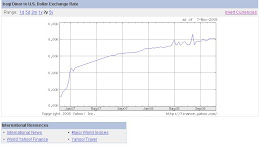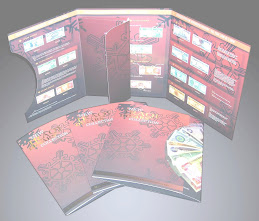President Bush Discusses Ways The Surge Is Helping Iraqis Reclaim Security And Restart Political And Economic Life
Today, President Bush visited the National Museum of the United States Air Force and discussed the political and economic changes currently taking place in Iraq.
Last year, the President ordered 30,000 additional soldiers and Marines into Iraq, and gave them a new mission, to focus on protecting the Iraqi people, and to hold the gains that had been made. The other goal of the surge was to open up space for political and economic progress after security returned. So the U.S. deployed additional civilian experts and more than doubled the number of Provincial Reconstruction Teams, with a mission to ensure the security gains were followed by improvements in daily life.
Civil Society Is Beginning To Grow In Iraq
The surge is yielding major changes in Iraqi political life. With security improving, local citizens have restarted the political process in neighborhoods, cities, and provinces. Grassroots movements have sprung up all around the country. These groups of citizens are determined to protect their communities, they are determined to fight extremism, and they increasingly participate in civic life.
- Today, some 90,000 Iraqis belong to local citizens group bearing the name "Sons of Iraq." The Iraqi Government has pledged to incorporate about 20 to 30 percent of these "Sons of Iraq" into the Iraqi army and police forces.
- Leaders in Baghdad are responding and the legislative achievements in Baghdad over the past four months have been remarkable.
- In December, the government enacted a pension law that will allow tens of thousands of Sunnis to collect the retirement benefits they were promised.
- In January, leaders enacted a de-Ba'athification law that allows mid-level Baath party members to re-enter political and civic life.
- In February, leaders enacted a budget that increases spending on security capital reconstruction projects and provincial governments.
- The same day in February, leaders enacted an amnesty law to resolves the status of many Iraqis held in Iraqi custody.
- Last week, leaders reached agreement on a provincial powers law that helps define Iraqi federalism, and sets the stage for provincial elections later this year. That is an important piece of legislation because it will give Iraqis who boycotted the last provincial elections – such as Sunnis in Anbar or Ninewa provinces – a chance to go to the polls and have a voice in their future.
The U.S. more than doubled the number of Provincial Reconstruction Teams. Karbala PRT helped local residents establish a women's center to provide education and promote equality.
- With support of PRTs, Ramadi now has a fully-staffed mayor's office and neighborhood councils have formed. Judges are presiding over courts and restoring the rule of law.
Iraq Has Great Economic Potential
The improvements in security resulting from the surge are enabling Iraqis to make progress on their economy. Since the surge began:
- Business registrations have increased by more than nine percent;
- Total inflation has fallen by more than 60 percentage points;
- Investment in energy and telecom industries has increased;
- Oil production is up, particularly north of Baghdad;
- The national government has announced a plan to reform the food rationing system; and
- Economic growth is projected to be a robust seven percent this year.
- Iraqis still have work to do in their economy. The reforms needed to transition from a command-and-control economy to a modern market-based system are complex and will take more time. Centralized electricity generation is now above pre-war levels, but it is not sufficient to meet the needs of Iraq's growing demand. Other key infrastructure needs to be upgraded, especially energy pipelines and storage facilities. Unemployment is too high, and corruption remains a challenge.
Iraq's Government Has Stepped Forward To Meet More Of Its Own Expenses
Early in the war, the U.S. funded most of the large-scale reconstruction projects in Iraq. Now the U.S. is focusing on encouraging entrepreneurship. The Iraqi government is stepping up on reconstruction projects. They have outspent the U.S. in recent budget 11 to one, and soon we expect the Iraqis will cover 100 percent of these expenses.
- Initially, the U.S. paid for most of the costs of training and equipping the Iraqi Security Forces. Now Iraq's budget covers three-quarters of the cost of its security forces, which is a total of more than $9 billion in 2008. Soon, we expect Iraq to shoulder the full burden of their security forces.
- The national government has now committed $196 million to fund jobs programs so that brave Iraqis who stand up to the extremists and the murders and the criminals can learn the skills they need to help build a free and prosperous nation.
Iraq Is Strengthening Its Relationship With Other Nations
Iraq wants to solidify its relationship with the United States. Last year, Iraqi leaders requested to form a long-term strategic partnership with the U.S. This partnership would help assure Iraqis that political and economic and security cooperation between the nations will endure. This partnership would also ensure protections for American troops when the U.N. mandate for Multi-National Forces in Iraq expires this December. This partnership would not bind future President's to specific troop levels. This partnership would not establish permanent bases in Iraq.
The surge is helping give Iraq's leaders the confidence to expand their international engagement.
- Iraqi leaders are working hard to meet the criterion required to join the World Trade Organization, which would help its entrepreneurs benefit from the opportunities of a global economy.
- Iraq has taken steps to attract foreign investment, including hosting its first "Business to Business" expo since the Gulf War.
- The government is meeting its pledge to reform its economy in exchange for development assistance and debt relief through the International Compact for Iraq.
Much of the world is increasing its commitment to Iraq. The United Kingdom, Italy, and South Korea are leading PRTs in Iraq. The United Nations is playing an expanded role in Iraq, and will help prepare for this year's provincial elections.
- Next month, the third Expanded Neighbors Conference will meet in Kuwait City to discuss ways the region and the world can further support Iraq's political, economic, and security progress. This is a key diplomatic initiative. It will include all of Iraq's neighbors, as well as the permanent members of the United Nations Security Council, the G-8, the Arab League, and the Organization of the Islamic Conference.
The Progress In Iraq Is Real, It's Substantive, But It's Reversible
Helping Iraqis defeat their enemies and build a free society would be a strategic victory that would resound far beyond Iraq's borders. If al Qaeda is defeated in Iraq after all the resources it has poured into the battle there, it will be a powerful blow against the global terrorist movement. If Iran is turned back in its attempt to gain undue influence over Iraq, it will be a setback to its ambitions to dominate the region. If people across the Middle East see freedom prevail in multi-ethnic, multi-sectarian Iraq, it will mark a decisive break from the long reign of tyranny in that region. And if the Middle East grows in freedom and prosperity, the appeal of extremism will decline, the prospects of peace will advance, and the American people will be safer here at home.
Retreating from Iraq would carry enormous strategic costs for the United States. It would increase the likelihood that al Qaeda would gain safe havens that they could use to attack us here at home. It would be a propaganda victory of colossal proportions for the global terrorist movement, which would gain new funds, and find new recruits, and conclude that the way to defeat America is to bleed us into submission. It would signal to Iran that we were not serious about confronting its efforts to impose its will on the region. It would signal to people across the Middle East that the United States cannot be trusted to keep its word. A defeat in Iraq would have consequences far beyond that country – and they would be felt by Americans here at home.

